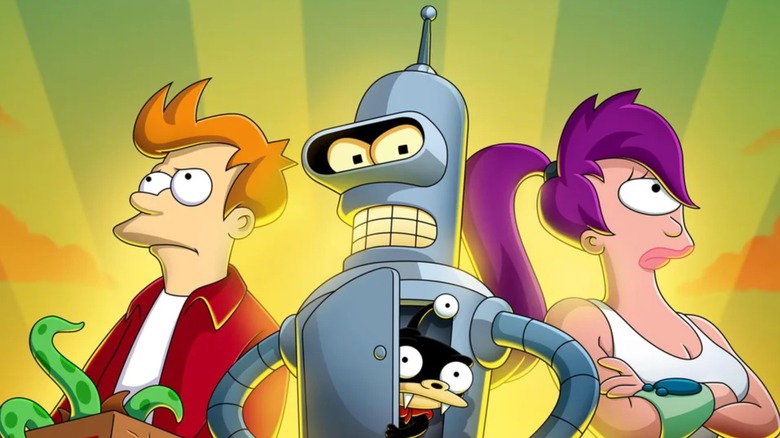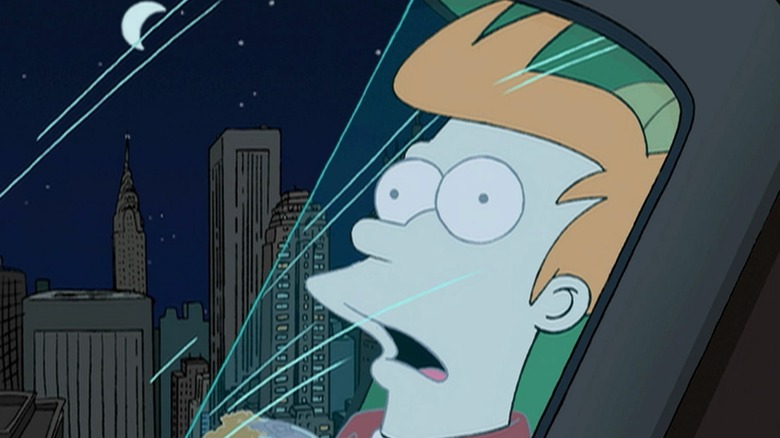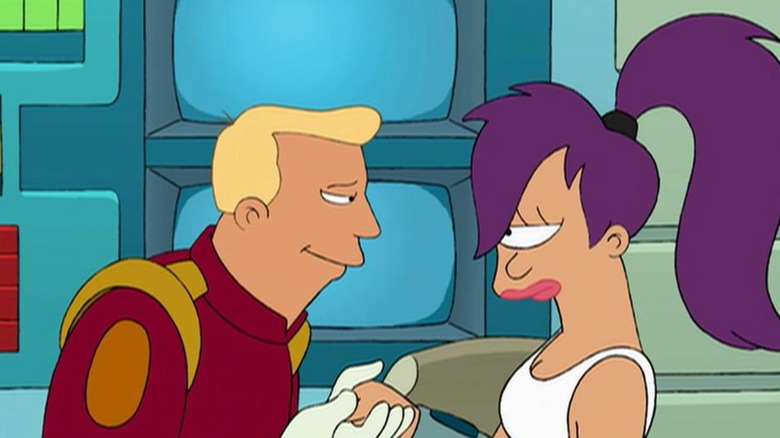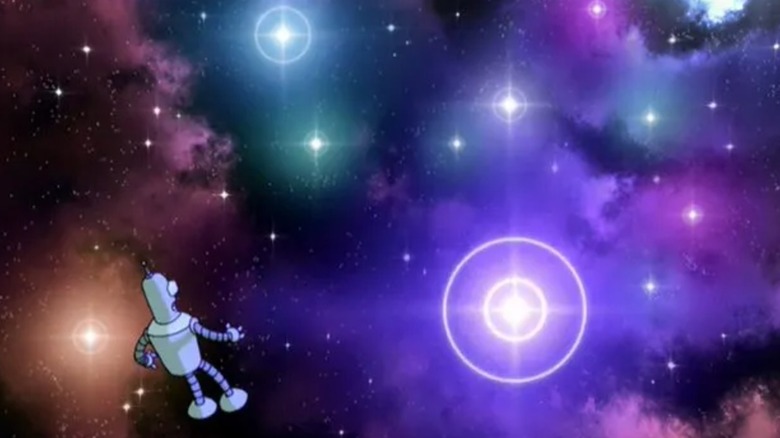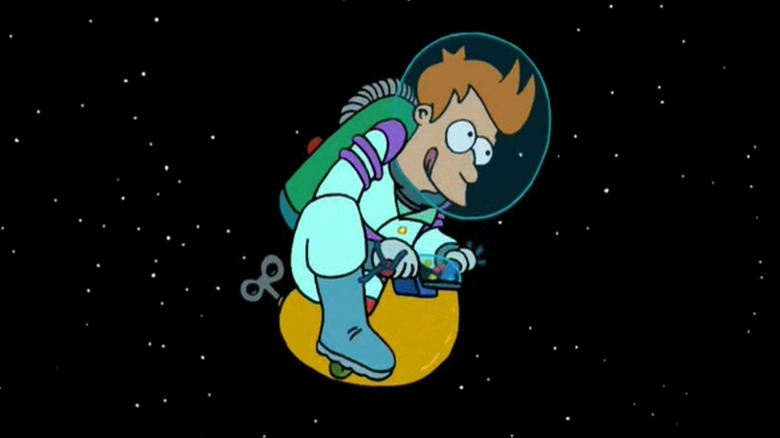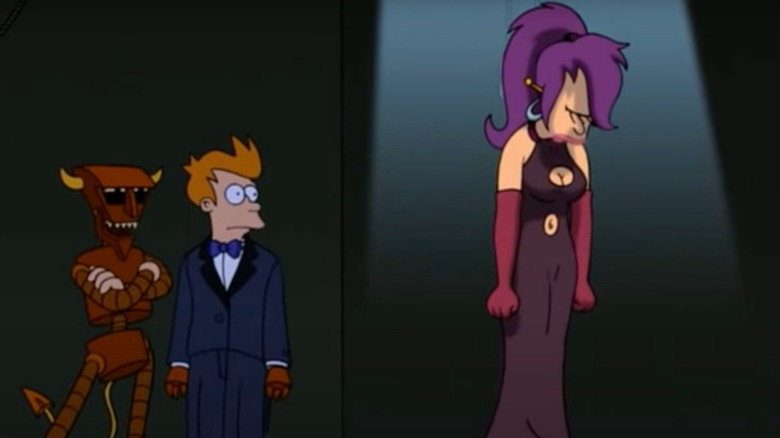5 Essential Futurama Episodes Everyone Needs To Watch At Least Once
How many seasons does the animated sci-fi sitcom "Futurama" have? That's a matter of debate, because its four original (production) seasons from 20th Century Fox were cut up into five seasons for broadcast. So depending on who you ask, "Futurama" either has 10 or 13 seasons. What isn't in contention is that "Futurama" is back for a new season on Hulu. So, now is a perfect time to dive into the series' 170 episodes.
Developed by "The Simpsons" creator Matt Groening and "Simpsons" writer David X. Cohen, "Futurama" debuted in 1999 and was a show tied to the end of the millennium. On December 31, 199, pizza delivery boy Philip J. Fry (Billy West) accidentally falls into a cryogenic chamber and spends 1000 years asleep. He wakes up in 2999 A.D., once more on the cusp of a new millennium.
Fry finds work as a spaceship delivery boy at Planet Express, run by his distant (by many generations) nephew, Professor Hubert Farnsworth (West as well). His coworkers are his crush, purple-haired cyclops Leela (Katey Sagal), foul-mouthed "lovable rascal" robot Bender (John DiMaggio), incompetent Dr. Zoidberg (West again), bureaucrat Hermes Conrad (Phil LaMarr) and klutzy engineering student Amy Wong (Lauren Tom).
Strap in, because "Futurama" delivers hilarity at faster than light speeds. The writers take full advantage of wide open possibilities of the future for different kinds of episodes; relatively straightforward science-fiction, genre parodies, romance, social satire, and more.
If you want to find out if "Futurama" is for you before you commit, here are five essential episodes that show the best the series has to offer. Disclaimer: just to show how good this show is, one could easily take this same listicle premise and come up with five totally different episodes, because there are a lot of great "Futurama" episodes.
Space Pilot 3000
There's no better place to start than at the beginning, and "Space Pilot 3000" is a perfect introduction to "Futurama." The episode is an origin story; the teaser is set in the 20th century, showing Fry getting frozen, then follows him meeting Leela, Bender, and finally the Professor after waking up 1000 years later.
Some of the oddities of the future in this episode got phased out. The episode's major plot device is "career chips," computer chips implanted in your hand designating your job, suggesting people are locked into their careers; Fry runs because he's got a second shot at life and doesn't want to be a delivery boy again. Later episodes mostly forget about career chips, but they don't forget about how people's living heads can be preserved in jars, or how people get around not by subway but by a tube system built in New New York City.
While the specifics of the setting took time to be ironed out, the characters' personalities are clear from the start, as is the series' overall tone. The future isn't a "1984" esque dystopia, but all the ways that modern life sucks basically still apply — those problems are just more madcap and zany due to advanced technology.
More than two decades on, "Space Pilot 3000" remains a breezy and off-the-walls romp perfect for creating new "Futurama" fans. You'll probably be watching the next episode, "The Series Has Landed," and meeting the rest of the Planet Express crew right after you finish this one.
Love's Labours Lost in Space
Outside of the seven-person Planet Express crew, the most famous "Futurama" character is Zapp Brannigan (Billy West, doing an impression of the late Phil Hartman), captain of the starship the Nimbus. Zapp is a parody of Captain Kirk; he has Kirk's reputation as a legendary starship captain and hero, but he's really selfish, dimwitted, misogynistic, and devoid of charisma (sexual or otherwise), the whole package!
Zapp first shows up in the series' fourth episode, "Love's Labours Lost in Space," alongside his beleaguered lieutenant Kif Kroker (Maurice LaMarche). Leela, who is very picky about men, is having trouble finding the right guy. When Planet Express is contracted to rescue animals from soon-to-implode planet Vergon 6, they run into Nimbus. Zapp is smitten with Leela; she, at first, is too due to his reputation, but she's turned off once he shows his true colors.
Then when Zapp invites Leela into his quarters, sobbing about how lonely he feels, Leela's standards break down and she has pity sex with him. Zapp stays purposefully blind to the "pity" part of that and is convinced Leela's in love with him. He'll be back many more times throughout the show, often trying to win her over, while Leela's one moment of weakness becomes her greatest shame.
After the pilot, "Love's Labours Lost in Space" was the first exceptional "Futurama" episode, one that showed how unique the show could be. The female lead having a lot of bad dates? That's a pretty standard sitcom plot, but "Futurama" does it by weaving in a "Star Trek" parody and a montage of the characters capturing alien animals. 170 episodes in and "Love's Labours Lost in Space" still stands as one of the funniest "Futurama" episodes too, largely thanks to Misters Brannigan and Kroker.
Godfellas
Bender is the undisputed breakout character of "Futurama." There are far and away more Bender episodes of "Futurama" than there ones are focused on any one of the remaining characters. (Just the way Bender likes it.) Picking the very best Bender episode is a tall task, but in my heart of hearts, it's got to be "Godfellas," written by prolific "Simpsons" and "Futurama" writer Ken Keeler.
While taking a nap in the Planet Express ship torpedo tube, Bender is accidentally fired into space. As he's seemingly doomed to drift alone for eternity, microscopic lifeforms take refuge on his body and build a civilization — with Bender as their God. He tries to be both a caring and then a non-interventionist God, and both approaches lead to catastrophe.
In a very "Star Trek" inspired turn of events, Bender eventually comes face to face with God, who appears as a disembodied nebula (voiced by Billy West). They discuss the challenges that come with Godhood in a way that only the two of them can understand; they both conclude that the best way to govern is with the lightest touch possible. God puts that message into action by leaving Bender, and us, with this lesson: "When you do things right, people won't be sure that you have done anything at all."
"Futurama" episodes often walk a tonal tightrope and "Godfellas" is one of the best examples of that. It's philosophical yet bursting with black comedy, and those two sides of the episodes are intertwined. Bender's attempts to be a God, and the consequences (like accidentally burning a crop field when he redirects some sunlight onto it — "When you're writing the Bible, you might want to omit that last miracle"), are hilarious yet brutal and the building block of the episode's earnest message. Not for nothing, Keeler's script for "Godfellas" earned him a Writers Guild of America Award.
The Why of Fry
Compared to most animated sitcoms, "Futurama" has a stricter canon. Sure, some small details don't always match up for the sake of humor, but there's big picture storylines that recur across a handful of vital episodes.
During the original "Futurama" run, those storylines culminated in "The Why of Fry." This episode is mostly a sequel to "The Day the Earth Stood Stupid," when floating, talking Brains invaded Earth and sapped everyone of their intelligence... except Fry, who lacks a delta brainwave. Nibbler, Leela's pet alien, is revealed to be part of a wise and ancient race (the Nibblonians) who fight against the Brains' evil plans.
In "The Why of Fry," Fry is feeling down that he's no more important in the future than he was in the 20th century, especially since Leela has no interest in him. But then the Nibblonians call upon him again, because now the Brains intend to destroy the entire universe after collecting every piece of its knowledge.
On one hand, "The Why of Fry" is one of the most lore-heavy "Futurama" episodes, and one that liberally references past episodes. So, not a great introduction, right? Well, my counterargument is that it's the first episode of "Futurama" that I saw. It didn't make me confused, just curious to seek out those previous episodes. It's an essential episode that established "Futurama" fans watch, too, because it's the culmination of Fry's character arc.
"The Why of Fry" highlights Fry's conflicted emotions about being frozen for 1000 years. He much prefers living in the future — if he hadn't been frozen he'd have never met Leela or Bender — but there's a part of him still upset that he lost the life and friends he already had back in 1999. So, in "The Why of Fry," he goes back in time and gets the choice to redo that fateful New Years' Eve... and he decides he'd prefer to be frozen.
The Devil's Hands Are Idle Playthings
"Futurama" has been canceled twice: its original run on Fox was from 1999 to 2003, before it was revived by Comedy Central for four direct to video movies and then 52 more episodes. The Comedy Central "Futurama" run ended in 2013, and the series lay dormant for a decade before returning on Hulu in 2023.
This pattern of cancellations and revivals has made the series' creators very conscious that every season of "Futurama" might be its last (for a while anyway). So, ever since 2003, they've written every season finale as if it is the finale. As Kayleigh Donaldson has written for /Film, "Futurama" has effectively had multiple series finales, each one focused on giving Fry and Leela a romantic happy ending because that's the series' emotional core.
Naturally, different "Futurama" fans have different favorite endings. For me, the show still hasn't quite topped its original series finale, "The Devil's Hands Are Idle Playthings."
Fry is learning to play the holophonor (an instrument that projects holograms to match the music it makes) in order to impress Leela and express how he feels for her more elegantly than he ever could in words. But his "stupid fingers" are keeping him from mastering the instrument. So, he makes a deal with the Robot Devil (Dan Castellaneta) to get replacement robot hands... by luck of the draw, Fry gets the Devil's own hands.
The episode turns into a musical during its climax, as Fry performs the holophonor opera he wrote in Leela's honor while the Devil enacts a scheme to steal his hands back. "The Devil's Hands Are Idle Playthings" is unrelentingly hilarious but it never forgets to play its audience's heartstrings either. Later "Futurama" finales would remember that balance, because "The Devil's Hands" already showed the perfect way to end this show.
"Futurama" is streaming on Hulu.
